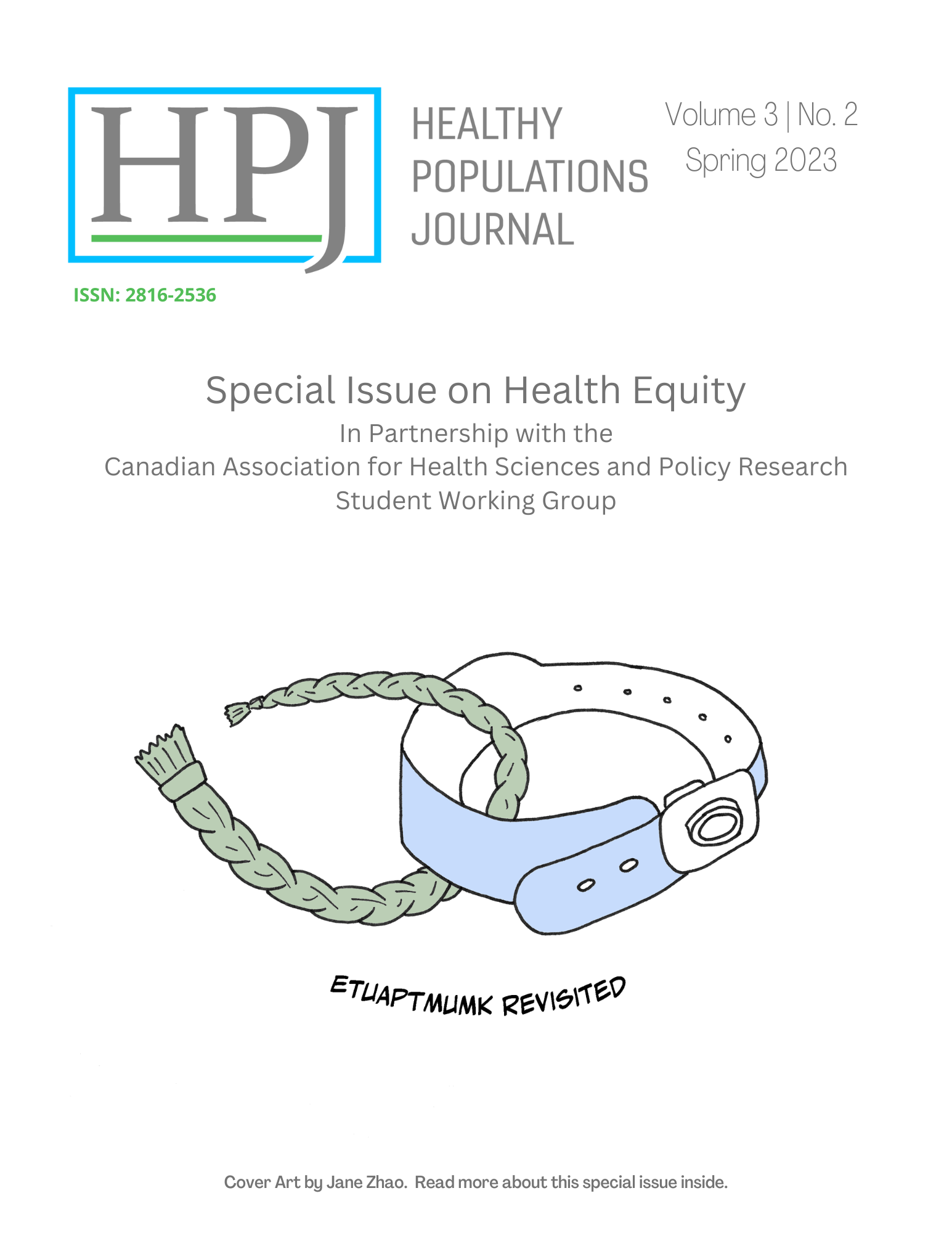More Research is Needed to Understand the Impact of Language Discordance in Long-Term Care in Canada
DOI:
https://doi.org/10.15273/hpj.v3i2.11596Keywords:
language, long-term care, outcome assessment, health equity.Abstract
There is consistent evidence highlighting the risks of language barriers and discordance to quality care and patient safety, especially in primary care and hospital settings. However, there has been limited research on the impact of language barriers and discordance on quality care for older individuals residing in long-term care. In this commentary, we highlight select studies on differences in health care access and outcomes that linguistic minorities experience in Canadian long-term care homes, and discuss the importance of tackling language barriers and discordance to equitable long-term care. This article reflects on the impact of language discordance in health care, an identified determinant of health disparities, and calls for further research on health inequity experienced by older adults in Canada as well as strategies toward more equitable care.
References
Batista, R., Prud‘homme, D., Rhodes, E., Hsu, A., Talarico, R., Reaume, M., Guérin, E., Bouchard, L., Desaulniers, J., Manuel, D., & Tanuseputro, P. (2021). Quality and safety in long-term care in Ontario: The impact of language discordance. Journal of Post-Acute and Long-term Care Medicine, 22(10), 2147–2153.e3. https://doi.org/10.1016/j.jamda.2020. 12.007
Braveman, P. A., Kumanyika, S., Fielding, J., LaVeist, T., Borrell, L. N., Manderscheid, R., & Troutman, A. (2011). Health disparities and health equity: The issue is justice. American Journal of Public Health, 101(Suppl 1), S149–S155. https://doi.org/10.2105/AJPH.2010.300062
Canadian Institute for Health Information. (2016, July 22). Pan-Canadian dialogue to advance the measurement of equity in health care: Proceedings report. https://secure.cihi.ca/free_products/Measurement_of_Equity_in_Health_Care_Proceedings_Report_EN.pdf
Cano-Ibáñez, N., Zolfaghari, Y., Amezcua-Prieto, C., & Khan, K. S. (2021). Physician–patient language discordance and poor health outcomes: A systematic scoping review. Frontiers in Public Health, 9, Article 629041. https://doi.org/ 10.3389/fpubh.2021.629041
de Moissac, D., & Bowen, S. (2019). Impact of language barriers on quality of care and patient safety for official language minority francophones in Canada. Journal of Patient Experience, 6(1), 24–32. https://doi.org/10.1177/ 2374373518769008
de Vries, K. (2013). Communicating with older people with dementia. Nursing Older People, 25(4), 30–37. https://doi.org/ 10.7748/nop2013.05.25.4.30.e429
Hsu, A. T., Ménard, A., & Scott, M. (2022, February 22). Understanding the long-term care experience of official language minorities in Canada: An environmental scan. Health Canada. https://sante-closm.ca/wp-content/uploads/2022/ 10/Hsu-A.-T.-Me%CC%81nard-A.-et-Scott-M.-2022b.pdf
Kitching, G. T., Firestone, M., Schei, B., Wolfe, S., Bourgeois, C., O‘Campo, P., Rotondi, M., Nisenbaum, R., Maddox, R., & Smylie, J. (2020). Unmet health needs and discrimination by healthcare providers among an Indigenous population in Toronto, Canada. Canadian Journal of Public Health, 111(1), 40–49. https://doi.org/10.17269/s41997-019-00242-z
Lane, G., & Vatanparast, H. (2022). Adjusting the Canadian healthcare system to meet newcomer needs. International Journal of Environmental Research and Public Health, 19(7), Article 3752. https://doi.org/10.3390/ijerph19073752
Marya, R., & Patel, R. (2021). Inflamed: Deep medicine and the anatomy of injustice. Macmillan.
Phillips-Beck, W., Eni, R., Lavoie, J. G., Avery Kinew, K., Kyoon Achan, G., & Katz, A. (2020). Confronting racism within the Canadian healthcare system: Systemic exclusion of First Nations from quality and consistent care. International Journal of Environmental Research and Public Health, 17(22), Article 8343. https://doi.org/10.3390/ijerph17228343
Qureshi, D., Schumacher, C., Talarico, R., Lapenskie, J., Tanuseputro, P., Scott, M., & Hsu, A. (2021). Describing differences among recent immigrants and long-standing residents waiting for long-term care: A population-based retrospective cohort study. Journal of Post-Acute and Long-Term Care Medicine, 22(3), 648–655. https://doi.org/10.1016/j.jamda.2020.07.018
Rasaputra, P., Sun, A. H., Clarke, A., Fung, C., Quail, P., Robert, B., & Hsu, A. T. (2023). End-of-life care for Chinese residents in ethnic and non-ethnic long-term care homes in Ontario, Canada: Differences in acute care use, reported pain, and place of death [Manuscript in preparation]. Bruyère Research Institute, Ottawa, Ontario, Canada.
Robinson, T. E., II, White, G. L., Jr., & Houchins, J. C. (2006). Improving communication with older patients: Tips from the literature. Family Practice Management, 13(8), 73–78. https://www.aafp.org/ pubs/fpm/issues/2006/0900/p73.html
Scott, M. M., Sun, A. H., Ménard, A., Rasaputra, P., Ramzy, A., Murmann, M., Cooper-Reed, A., & Hsu, A. T. (2023). Targeting health inequity for minority populations by exploring care-related outcomes in residential long-term care: A systematic review [Manuscript submitted for publication]. Bruyère Research Institute, Ottawa, Ontario, Canada.
Seale, E., Reaume, M., Batista, R., Eddeen, A. B., Roberts, R., Rhodes, E., McIsaac, D. I., Kendall, C. E., Sood, M. M., Prud‘homme, D., & Tanuseputro, P. (2022). Patient–physician language concordance and quality and safety outcomes among frail home care recipients admitted to hospital in Ontario, Canada. CMAJ, 194(26), E899–E908. https://doi.org/10.1503/cmaj.212155
Statistics Canada. (2022a, August 17). Increasing diversity of languages, other than English or French, spoken at home [Infographic]. https://www150.statcan.gc.ca/n1/pub/11-627-m/11-627-m2022051-eng.htm
Statistics Canada. (2022b, August 17). Language spoken most often at home by age: Canada, provinces and territories. https://doi.org/10.25318/9810022601-eng
Steinberg, E. M., Valenzuela-Araujo, D., Zickafoose, J. S., Kieffer, E., & DeCamp, L. R. (2016). The “battle” of managing language barriers in health care. Clinical Pediatrics, 55(14), 1318–1327. https://doi.org/10.1177/0009922816629760
Um, S. (2016, April). The cost of waiting for care: Delivering equitable long-term care for Toronto‘s diverse population. Wellesley Institute. https://www.homelesshub.ca/sites/default/files/attachments/The-Cost-of-Waiting-For-Care.pdf
Yap, T. L., Kennerly, S., Horn, S. D., Barrett, R., Dixon, J., & Bergstrom, N. (2019). Influence of nutrition and nonnutrition factors on pressure injury outcomes among at-risk Asian nursing home residents. Advances in Skin & Wound Care, 32(10), 463–469. https://doi.org/10.1097/01.ASW.0000579696.82285.3f
Downloads
Published
Issue
Section
License
Copyright (c) 2023 Alixe Ménard, Mary M Scott, Annie H Sun, Anna Cooper-Reed, Prabasha Rasaputra, Amy T Hsu

This work is licensed under a Creative Commons Attribution-NonCommercial 4.0 International License.
The journal aims to reduce barriers to publishing and sharing research and inequalities to accessing information.This journal provides immediate open access to its content on the principle that making research freely available to the public supports a greater global exchange of knowledge. The open-access nature of the journal means that there will be no charge for authors or readers to use the journal. The journal has a Creative Commons Attribution Non-Commercial (CCBYNC) attribution which allows the author (and others) to share and distribute their full-text article in other public domains, such as Google Scholar or Research Gate.

